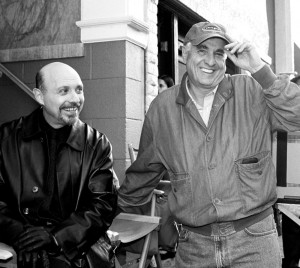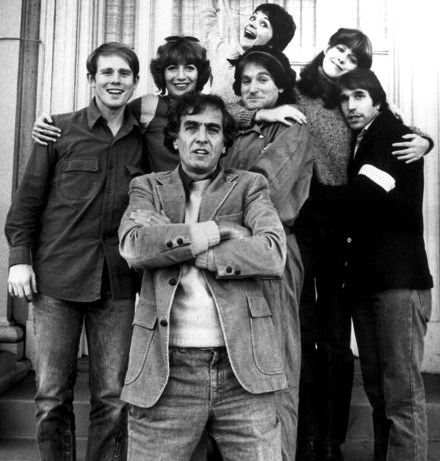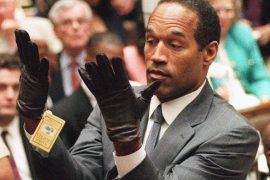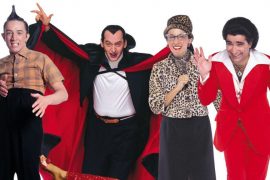
Poor Hector Elizondo. Now what is he going to do?
I thought of Elizondo first when I heard the news last week that Marshall, who’d had a series of strokes very recently, had passed away. He was 81.
Back in 2007, CBS held a TCA press tour party outdoors. I got talking to Elizondo at the event. Very informal, basically two guys talking next to a tree. I just remember he spoke with great affection for Marshall. The actor was like Marshall’s good luck charm, appearing in well over a dozen of the director’s films.
Elizondo also personified Marshall’s gift of putting great character actors in his projects and letting them do what they do best.
I also thought of Carl Reiner, and how hard it must be for a 94-year-old to see, one-by-one, talented friends pass away. Earlier this year it was Ann Guilbert from Reiner’s The Dick Van Dyke Show. Now Marshall, who was already writing scripts with partner Jerry Belson on Make Room for Danny and The Lucy Show when Reiner hired the pair to pen several Van Dyke Show scripts.
I collect Van Dykes on 16mm and threw one on the other night, the fifth season entry “Bad Reception in Albany.” Airing on CBS 50 years ago, it holds up as one of the funniest episodes of the series — even without Rose Marie and Morey Amsterdam. The premise finds Rob and Laura out of town for a wedding, only Rob has to find a TV that works in order to scout a woman for The Alan Brady Show. There’s a Seals convention going on at the hotel, packing the episode with several minor characters, all showbiz veterans. Reiner clearly had great affection for folks in radio and burlesque, with Tiny Brauer among the bar patrons. A young actress named Chanin Hale — later cast in Marshall and Benson’s follow-up sitcom Hey Landlord — stole scenes as a “hanky-panky” dancer named Sugar.
advertisement
Anyway, the episode had all the hallmarks of Marshall/Belson. It was funny, fast-paced, and spread the shtick around. They weren’t afraid to sneak actual jokes into the dialogue, either, as in when Rob is trying to remember the name of a church named after a child actor — and comes up with Shirley Temple.
 Marshall, of course, went on to be a Chuck Lorre-like force in TV comedy. He and Aaron Spelling did the impossible in the ’70s, making ABC the No. 1 network with big hits such as Laverne & Shirley, Happy Days and Mork & Mindy. Marshall has an amazing knack for spotting talent, making stars out of Robin Williams, Henry Winkler and his sister Penny Marshall, among many others. This was true even when he was bombing with Hey Landlord, where he went out and recruited several members of the then-fledgling comedy troupe The Committee.
Marshall, of course, went on to be a Chuck Lorre-like force in TV comedy. He and Aaron Spelling did the impossible in the ’70s, making ABC the No. 1 network with big hits such as Laverne & Shirley, Happy Days and Mork & Mindy. Marshall has an amazing knack for spotting talent, making stars out of Robin Williams, Henry Winkler and his sister Penny Marshall, among many others. This was true even when he was bombing with Hey Landlord, where he went out and recruited several members of the then-fledgling comedy troupe The Committee.
I don’t have any first person Marshall stories, although I’m pretty sure he made one or two TCA press tour appearances during my day. I have to admit I was never a big fan of his big ABC hits, but recognized that Marshall created very popular shows and had a knack of casting them with actors people just really wanted to visit every week. When Fonzie came through a door, it opened one to every actor who ever arrested a scene for applause from a studio audience — from Michael Richards to Jim Parsons.
People who knew him wrote lovely tributes last week, including a mentor of mine back in the TV Guide days, Ray Bennett. Donal Logue also posted a wonderful tribute on Facebook with the kind of stories that show why Marshall was even more loved than his shows. Marshall directed Logue in the 1996 comedy starring Greg Kinnear, “Dear God.” Read the first graph of Logue’s tribute below:
Garry Marshall was the nicest guy in Hollywood. Truth. I was lucky enough to work for him a couple of times and everyday was a joy. He would egg us on to improv, mess up, goof off, do anything to get a laugh. He had competitions who could do the goofiest “slates” for camera. He’d always say, “Do the funny with the funny!” I met him once at his office in the Falcon Theater in Burbank and a sign over the door to his office read: “It’s nice to be important, it’s more important to be nice.” He lived by that. And, by any standard imaginable, he was important.






